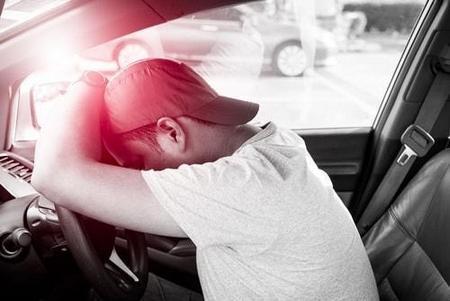Drivers’ Lack of Sleep Put You in Danger
 Safely and responsibly driving a car requires both skill and concentration. Skill is obtained with practice, but concentration often hinges of the level of alertness of the driver. Lacking either skill or concentration can result in a serious car accident that causes significant injuries. Appropriate concentration allows a driver to perceive, anticipate, and respond to hazards and other dangers on the road that could impact safe driving, and the absence of concentration is known to greatly increase the risk a driver will miss a key issue or make a bad decision. Distractions are one way in which drivers lose this attention to the road, but another one that is harder to control, and likely an issue for every driver at some point, is fatigue. Fatigue can hit a driver at any point during the day, but is most prevalent at night, when more concentration is required to make up for the lack of visibility on darkened roads.
Safely and responsibly driving a car requires both skill and concentration. Skill is obtained with practice, but concentration often hinges of the level of alertness of the driver. Lacking either skill or concentration can result in a serious car accident that causes significant injuries. Appropriate concentration allows a driver to perceive, anticipate, and respond to hazards and other dangers on the road that could impact safe driving, and the absence of concentration is known to greatly increase the risk a driver will miss a key issue or make a bad decision. Distractions are one way in which drivers lose this attention to the road, but another one that is harder to control, and likely an issue for every driver at some point, is fatigue. Fatigue can hit a driver at any point during the day, but is most prevalent at night, when more concentration is required to make up for the lack of visibility on darkened roads.
Fatigue can cause a driver to lose control, crossover into traffic, or hit parked cars, a situation that was tragically played out in southern Illinois when a tired Tennessee man left the road and overcorrected. His actions caused the car to hit a guardrail, injuring one passenger and killing another. Everyone is potentially at risk for driving in this situation, and understanding what the effects of fatigue are, as well as the legal consequences if an injury occurs, is important information for all drivers.
The Effect of Fatigue on Driving
Everyone knows what it feels like to be extremely tired, and many people know what the experience of intoxication is. Depending on how much time has elapsed since the driver last slept, extreme fatigue can produce the same behavior observed in drivers with 0.08 blood alcohol levels, the amount legally considered drunk driving. Any notable level of fatigue will slow reaction times and impair a driver’s ability to process information. Further, fatigued drivers may not be aware of how tired they really are, and engage in microbursts of sleep, lasting four to five seconds, that can easily lead to serious accidents.
What Causes Fatigue
Fatigued driving is most commonly caused by inadequate rest or sleep loss, but can also stem from improper use of sleep aids and the use of medications that have a sedative effect. The time of day can also affect when a driver becomes fatigued, as does the amount of time the driver is on the road. Younger drivers, shift workers, and those with undiagnosed sleep disorders are particularly at risk of driving when fatigued.
Liability for an Accident
Many causes can lead to a serious injury or death in a car accident, and a victim is understandably concerned about holding the driver responsible for his/her suffering. All drivers have a duty to operate their vehicle in a safe and reasonable manner, and fatigued driving directly inhibits a driver’s ability to meet this standard. Obtaining compensation for an accident requires proving the other driver was at fault for the collision, and some characteristics that are common to fatigued driving accidents include:
- Late night/early morning crashes;
- A vehicle leaving the road;
- No attempt to avoid the collision;
- The driver is alone; or
- The accident occurred on a high-speed road.
These factors can be used to show a driver was negligent, and the cause of the plaintiff’s injuries. Proving negligence is rarely cut and dry, and requires the services of an experienced car accident attorney to conduct a thorough investigation and gather strong evidence of liability.
Speak to a Lawyer
People traveling on the road need to trust the other drivers are competent to operate their vehicles, and if you were injured because someone acted unreasonably or recklessly, talk to the dedicated DuPage County personal injury attorneys at Mevorah & Giglio Law Offices. We know how to build a strong case, and will fight to get you the compensation you deserve. Contact the office at 630-932-9100 for a free initial consultation.
Sources:
https://www.bnd.com/news/local/article214197264.html
https://www.cdc.gov/features/dsdrowsydriving/index.html
 English,
English,
 Spanish,
Spanish,
 Polish,
Polish,
 Urdu
Urdu













 Make a Payment
Make a Payment



